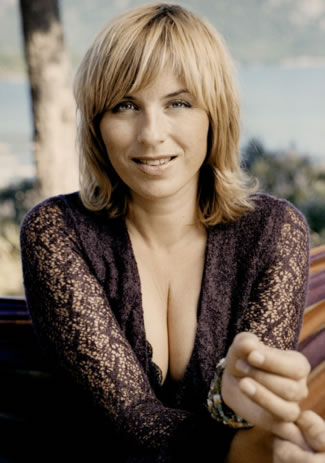
images © Universal Music (Norway) 2004
click on images to visit artist's website
Silje Nergaard
accessible jazz-pop crossover
concert and album reviews
Cheltenham Jazz Festival (2004)
Soho Jazz Club (2004)
Port of Call (2000)
At First Light (2001)
Nightwatch (2003)
Reviews © Stephen Lambe 2004
Editing and HTML © Russell W. Elliot 2004
Photos © Mathias Bothor | Universal Music (Norway) 2001-2004
used with permission
Formatted for 800 x 600 or larger windows
Last updated: 15 May 2004
Norwegian Silje Nergaard first came to the attention of our editors back in 1990, when her debut pop album, Tell Me Where You're Going, and the single of the same name, were minor hits in the United Kingdom. This first CD, produced by Richard Niles and featuring a contribution from jazz legend Pat Metheney, showcased her sweet, childlike voice and talented song writing. Like many artists of her type, her pop career floundered, and after four years in London she returned to Norway. She is now working successfully within the pure jazz idiom, and we were intrigued to see her at the Cheltenham Jazz festival. Enthusiasts of Bel Canto and Anneli Drecker (feature) will certainly be drawn to Silje Nergaard's voice although fans of the evolving jazz female vocals style would be more attracted to Norah Jones (Feels Like Home review, Come Away With Me review) and Katie Melua (feature article under construction).
Concert Reviews
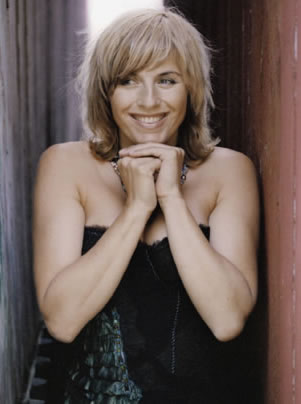 Image © Unversal Music (Norway) 2003 |
The Cheltenham Jazz Festival 4 May 2004.
This was a spellbinding, 90-minute performance. As Silje now performs on the jazz circuit--though in Norway and Germany particularly, she has a more mainstream audience--she performed here with her regular band of Norwegian musicians. These included the excellent Tord Gustavsen on piano, Fender Rhodes and melodica, plus upright bass and drums. Significantly, she also added the guitar of Hallgrim Bratberg, giving the band a more contemporary, crossover sound. These were jazz musicians, but with a level of versatility that allowed them to play jazz funk, or pop and folk, with great dexterity. However, it was in the late-night, sparse jazz vibe that the band truly excelled.As for Silje herself, she delivered a note-perfect performance, laced with a halting charm that reminded us of Sylvia Erichsen of Norwegian progressive band White Willow. Her voice has certainly matured since 1990, though it is still not really a traditional jazz voice. Girlish, yet both beautiful and sexy, she has excellent phrasing, but refrains from vocal gymnastics, preferring to bring the melody of the song across as effectively as possible.
Unlike many jazz vocalists, she now avoids the "standards," choosing, instead, her own, excellent songs, plus a few well-chosen covers from the pop world, here represented by Sting's "If You Love Somebody Set Them Free" and the David Bowie/Pat Metheney song "This is not America" both given jazz arrangements. Of her own songs, highlights included the funky "Keep On Backing Losers," the perky "Take A Long, Long Walk," the smoky jazz of "Unbreakable Heart" and the hypnotic, folky "Borrowing Moons" as well as final encore, the lovely ballad "Japanese Blue."
Live at Soho Jazz Club at Pizza Express, London, 21 November 2004.
Having been introduced to the music of Silje six months ago, we were interest to see how easily her set transferred from a theatre setting to the more intimate confines of a small Central London. We need not have worried, as she showed herself equally adept at charming a live audience as she did in the larger, theatre setting of Cheltenham.Knowledge of the material allowed concentration on the subtlety of the musicians, especially the amount of space they allow themselves during the lush ballads. This was supremely confident playing, most notably on the cover version of Sting’s “If you love somebody” where the piece built from a low, bluesy rumble to a full swing over its 5 minutes. Pianist Tord Gustavsen’s Fender Rhodes playing was particularly enjoyed, as well as his atmospheric, almost classical piano interlude later in the set. A new guitarist has added some gentle pedal steel to the arrangements; alongside some fluent jazz lead playing.
Set list: "Borrowing Moons," "How am I supposed to see the stars," "If you love Somebody," "This is not America," "Be Still My Heart," "Dance Me Love," "Tell me where you're going," "Keep on backing losers," "I don't want to see you cry," "Take a Long," "Long Walk." Encores: "Lullaby to Erle," "Japanese Blue."
Silje herself was typically delightful, elegantly waltzing through the evening with her perfect phrasing. She engaged the audience delightfully with her halting charm between songs, while she and her band, once again, demonstrated admirable versatility, especially during the up tempo, funky numbers. Overall, this was an excellent, relaxed evening from a jazz star in the making. Oh, and the pizza was good, too.--Stephen Lambe in Cheltenham, England 
Album Reviews
Though Silje has recorded eight albums in total, we review her last three--Port of Call, At First Light and Nightwatch--here. They are very much a trio. The packaging, significantly, on all three is very contemporary. There is very little to tell the listener that they are about to listen to jazz, and each makes excellent use of Silje's feminine charms. In terms of mood, there is also some consistency. The jazz trio of Tord Gustavsen on piano and keyboards, Harald Johnsen on acoustic bass and Jarle Vespestad on drums provides the backbone of the sound, whilst solo sax, trumpet and guitar, as well as other horns and strings provide lush colour throughout.
There is, however, plenty of development over the two and a half hours that these albums represent. Port of Call features only three original songs, whereas by Nightwatch eleven out of the twelve are the artist's own. The later two albums also sway between the cool jazz of the previous album, some light funk and poppier, singer-songwriter material.
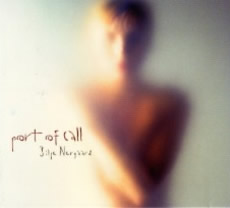 Image © Unversal Music (Norway) 2000 |
Port Of Call (Universal (Norway) 157 687-2, 2000).
After four years away from recording previously, Silje returned with the polished jazz of Port of Call. Here she tackles a variety of songs, some of them jazz standards, others slightly more left-of-field choices and, of course three original songs with inventive lyricist Mike McGurk. Jaunty original song "Why Oh Why" opens, followed by a charming, smoky version of the Rogers and Hart song "Bewitched, Bothered and Bewildered." Duke Ellington's "Do Nothing Til You Hear From Me" is followed by a delightfully atmospheric jazz interpretation of Sting's "If You Love Somebody Set Them free," with Tord Gustavsen's Fender Rhodes a delight.After the ballad "What’s New," a folky violin introduces the second original song, the wonderful
"The Waltz," full of charm and character. Paul Simon's typical "You're Kind" continues the theme of
choosing interesting cover versions, as does "For all we know," before third original song, the
guitar-led "Shame on You."
 The orchestra-dominated "Every Time We Say Goodbye" is a fairly
vanilla version of a jazz standard, as is the charming "Dream a Little Dream."
Billie Holliday, a
singer that Silje has some similarities to vocally, provides the closing "Don't Explain."
The orchestra-dominated "Every Time We Say Goodbye" is a fairly
vanilla version of a jazz standard, as is the charming "Dream a Little Dream."
Billie Holliday, a
singer that Silje has some similarities to vocally, provides the closing "Don't Explain."

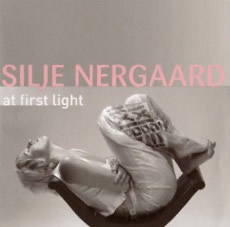 Image © Unversal Music (Norway) 2001 |
At First Light (Universal (Norway) 014 748-2, 2001). The album clearly marks a significant step forward in terms of confidence and nine of the twelve songs are originals. Though the overall mood is similar, there are more pop influences, particularly in the vocal arrangements. That said, "There’s Always a First Time" is cool, surreal jazz at its best. The wonderful "Be Still My Heart" is the album's least jazzy track. The three covers are well chosen. "Let there be Love" is a standard, but one which suits Silje well, and Stevie Wonder's "Blame It On The Sun" is also an excellent choice. Hoagy Carmichael's "Two Sleepy People" is a delight.
Of the other original songs, "So Sorry For Your Love" is slow, atmospheric jazz, whereas
"Now and Then" has a strong flavour of the 60s about it, bright and danceable, with some
fine guitar. The excellent "Keep on Backing Losers" is Silje's first excursion into up-tempo
jazz funk, while the title track "At First Light" combines a surreal, horn-led verse with a
catchy chorus.
 The perky "There's Trouble Brewing" again suggests the 60s, while ballad
"Japanese Blue," with its amazing, breathy sax is a superb song and an album highlight.
The album closes with the charming, folky "Lullaby To Earl” featuring Silje's long term
collaborator Nils Einar Vinjor, whose work can also be found on Tirill Mohn's album A Dance
with the Shadows (review).
The perky "There's Trouble Brewing" again suggests the 60s, while ballad
"Japanese Blue," with its amazing, breathy sax is a superb song and an album highlight.
The album closes with the charming, folky "Lullaby To Earl” featuring Silje's long term
collaborator Nils Einar Vinjor, whose work can also be found on Tirill Mohn's album A Dance
with the Shadows (review).

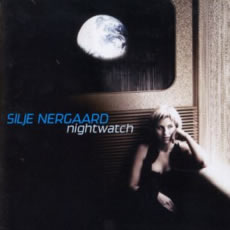 Image © Unversal Music (Norway) 2003 |
Nightwatch (Universal (Norway) 0602498656488, 2003).
Silje's latest album is perhaps marginally less varied than At First Light, but contains only one cover, a wonderful version of Pat Metheney and David Bowie’s hit "This Is Not America", and the original material is without question her strongest yet. The album opens with the charming, Stevie Wonder-influenced "How Am I Supposed To See the Stars," before the livelier "Once I Held A moon" gives way to the superb, romantic "Dance Me Love" with some delightful trumpet from Peter Asplund.The catchy "You Send Me Flowers" feature some great vibes from Rob Waring, and the gentle "I Don't Want To See You Cry," again with Stevie Wonder a strong influence, provides another lovely melody. "In A Sentence" returns to pure, minimalist jazz, while "Take A Long Walk" once again wanders into funk territory, a catchy tune masking a rather acidic lyric.
"Be Gone" is uptempo and bluesy in Steely Dan style, but "Borrowing Moons," with
its sweet acoustic guitar and impossibly romantic lyric, not to mention complex lyrical
 arrangement and wonderful trumpet, is quite perfect. It is back to cool jazz--in tone
and lyric--for "Unbreakable Heart" and the orchestral "On and On." The album grew on
us with repeated plays and is clearly the artist's most mature work to date.
arrangement and wonderful trumpet, is quite perfect. It is back to cool jazz--in tone
and lyric--for "Unbreakable Heart" and the orchestral "On and On." The album grew on
us with repeated plays and is clearly the artist's most mature work to date.

Not only are these albums wonderfully polished, courtesy of some excellent production from Georg Wadenius and a versatile band, but they represent an artist of maturity and genuine talent that deserves to be heard outside the specialised jazz arena throughout the world. Stephen Lambe in Cheltenham and Russ Elliot in New York
Return to website contents